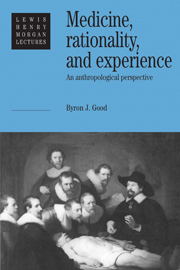Book contents
- Frontmatter
- Contents
- List of figures
- Foreword by ANTHONY T. CARTER
- Preface
- 1 Medical anthropology and the problem of belief
- 2 Illness representations in medical anthropology: a reading of the field
- 3 How medicine constructs its objects
- 4 Semiotics and the study of medical reality
- 5 The body, illness experience, and the lifeworld: a phenomenological account of chronic pain
- 6 The narrative representation of illness
- 7 Aesthetics, rationality, and medical anthropology
- Notes
- References
- Author Index
- Subject Index
4 - Semiotics and the study of medical reality
Published online by Cambridge University Press: 05 June 2012
- Frontmatter
- Contents
- List of figures
- Foreword by ANTHONY T. CARTER
- Preface
- 1 Medical anthropology and the problem of belief
- 2 Illness representations in medical anthropology: a reading of the field
- 3 How medicine constructs its objects
- 4 Semiotics and the study of medical reality
- 5 The body, illness experience, and the lifeworld: a phenomenological account of chronic pain
- 6 The narrative representation of illness
- 7 Aesthetics, rationality, and medical anthropology
- Notes
- References
- Author Index
- Subject Index
Summary
Throughout his work, Cassirer asserted that symbolic forms are “organs of reality,” that they are formative of what we apprehend as real and available to human knowing and acting. In Language and Myth (1946: 8), he wrote:
… the special symbolic forms are not imitations, but organs of reality, since it is solely by their agency that anything real becomes an object for intellectual apprehension and as such is made visible to us. The question as to what reality is apart from these forms, and what are its independent attributes, becomes irrelevant here.
In this chapter I continue my reflection on medicine as a symbolic form through a discussion of medical semiotics. The argument that human biology or disease is “very much within culture” and best understood as a symbolic form is strongly counter-intuitive, unless we interpret this as a rather trivial recognition that all consciousness and therefore knowledge is symbolic or meaningful. Cassirer made a much stronger claim, however, when he argued that science, aesthetics, and religion are each distinctive forms of knowledge, and that mythology, for example, is a special form of reality (rather than a psychological or symbolic distortion) and a mode of apprehending the world (1955b). Cassirer's philosophical position is closely akin to the historicist theory of culture that emerged in the Boasian tradition, sharing a concern for how historically evolving cultural forms mediate experience and knowledge.
- Type
- Chapter
- Information
- Medicine, Rationality and ExperienceAn Anthropological Perspective, pp. 88 - 115Publisher: Cambridge University PressPrint publication year: 1993

